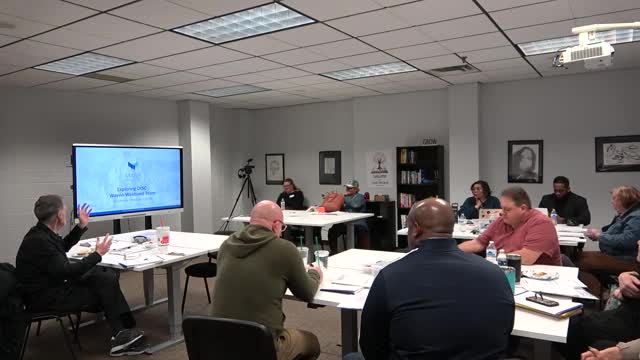Board holds DISC communication workshop with MASB; members share preferences and next steps
January 25, 2025 | Wayne-Westland Community School District, School Boards, Michigan
This article was created by AI summarizing key points discussed. AI makes mistakes, so for full details and context, please refer to the video of the full meeting. Please report any errors so we can fix them. Report an error »

The Board of Education and district administrators spent a Saturday session on a DISC behavioral-styles workshop led by Mackenzie Felpusch of the Michigan Association of School Boards (MASB). The presenter explained the assessment and led the board through individual and team exercises intended to improve communication and team functioning.
"DISC is about how we do what we do," the MASB education programming manager said while introducing the typology. The session included an explanation of the four factors (Dominance, Influence, Steadiness, Compliance), natural versus adapted styles, and practical exercises to identify how board members prefer to be communicated with and what they find off-putting.
Why it matters: several board members said the workshop helped them understand differences in how colleagues approach meetings and decisions, and they asked staff to add DISC summaries to future meeting packets to aid communication and committee assignments.
What took place
- Presentation and overview: Mackenzie Felpusch presented DISC fundamentals and guided members through their individual reports and a team report that mapped members into roles such as "supporter" and "implementer." Felpusch described the difference between a person's "natural" style (how they behave when not adapting) and their "adapted" style (how they behave to meet situational demands).
- Exercises: Board members completed "yes" and "no" communication preference lists (what they like and dislike in communication) and shared one item from each list. Examples included requests for clear facts and timelines, a preference for warm, sincere tone, and notes to avoid loud confrontation or talking down.
- Team report and next steps: Felpusch reviewed a team DISC wheel showing the distribution of styles, suggested discussion prompts for committee-level use, and offered to transcribe attendees' communication preferences and return a consolidated summary. Board members asked that DISC summaries or the team wheel be included in meeting packets and expressed interest in a follow-up deeper dive.
Board comments and follow-up
Board members commented that the training helped normalize different communication preferences and recommended using the report to inform committee composition and interactions. Several members suggested the district invite the presenter back for a focused team debrief or to run a subsequent session to translate the report into committee-level practices. Felpusch offered to transcribe participants’ purple/orange preference cards and return a consolidated summary to the board.
Ending note
Board members thanked MASB and district staff for organizing the session. Several members explicitly asked that the materials be included in Monday’s packet and that the district consider follow-up work to embed lessons learned into board practice.
"DISC is about how we do what we do," the MASB education programming manager said while introducing the typology. The session included an explanation of the four factors (Dominance, Influence, Steadiness, Compliance), natural versus adapted styles, and practical exercises to identify how board members prefer to be communicated with and what they find off-putting.
Why it matters: several board members said the workshop helped them understand differences in how colleagues approach meetings and decisions, and they asked staff to add DISC summaries to future meeting packets to aid communication and committee assignments.
What took place
- Presentation and overview: Mackenzie Felpusch presented DISC fundamentals and guided members through their individual reports and a team report that mapped members into roles such as "supporter" and "implementer." Felpusch described the difference between a person's "natural" style (how they behave when not adapting) and their "adapted" style (how they behave to meet situational demands).
- Exercises: Board members completed "yes" and "no" communication preference lists (what they like and dislike in communication) and shared one item from each list. Examples included requests for clear facts and timelines, a preference for warm, sincere tone, and notes to avoid loud confrontation or talking down.
- Team report and next steps: Felpusch reviewed a team DISC wheel showing the distribution of styles, suggested discussion prompts for committee-level use, and offered to transcribe attendees' communication preferences and return a consolidated summary. Board members asked that DISC summaries or the team wheel be included in meeting packets and expressed interest in a follow-up deeper dive.
Board comments and follow-up
Board members commented that the training helped normalize different communication preferences and recommended using the report to inform committee composition and interactions. Several members suggested the district invite the presenter back for a focused team debrief or to run a subsequent session to translate the report into committee-level practices. Felpusch offered to transcribe participants’ purple/orange preference cards and return a consolidated summary to the board.
Ending note
Board members thanked MASB and district staff for organizing the session. Several members explicitly asked that the materials be included in Monday’s packet and that the district consider follow-up work to embed lessons learned into board practice.
View the Full Meeting & All Its Details
This article offers just a summary. Unlock complete video, transcripts, and insights as a Founder Member.
✓
Watch full, unedited meeting videos
✓
Search every word spoken in unlimited transcripts
✓
AI summaries & real-time alerts (all government levels)
✓
Permanent access to expanding government content
30-day money-back guarantee

